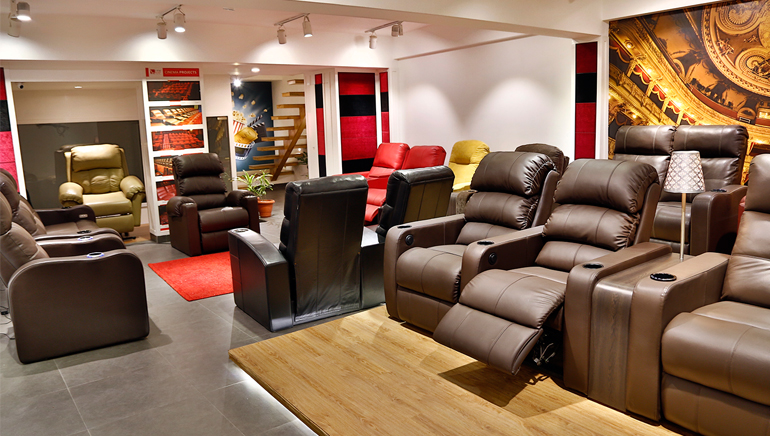With an increase in per capita income and growing aspirations, people are eventually taking shine to beautiful homes and better living. Nowadays consumers prefer customized furniture and recliners are becoming their favourite pick. Any room filled with recliners automatically attracts eye-balls as they are a perfect amalgamation of class and comfort. As more and more people are looking for relaxation and a stress free living, they are turning to comfortable recliners as an easy solution for either home or office use. These beauties not only add splendor to your house, but also serve as a solution to all your mild body pains. Besides allowing you to put your feet up, recliners have many add-on health benefits such as improving blood circulation, relieving back pain and easing muscle stress.
Though you may feel like picking a recliner that spoils you completely lounging and size and space must be taken care of.
Lounging
While the chair slides back into a more comfortable position and makes you feel comfortable, it also relieves the weight and stress from the muscles in your legs.
Size and Shape
Moreover, with limited space in the newly constructed houses one must consider not only the space available in one’s living room, but also the size of the recliner that would fit one’s shape as well.
Longevity and Usage
Be sure that your investment is worth the cost of the recliner. Cross-check if the quality of fabric, leather, wood and metal from each recliner is crafted within the parameters of the chair or sofa.
Ergonomic Value
Sometimes getting up from a seated position is an extremely difficult thing to do, and when we look at the physical process of doing so anatomically, there is always a revelation.
Customize to Your Choice
There is an array of leather and fabric to pick from.
List of Must-Have Features
Recliners offer a varied range of features, so it is always better to shortlist the must have features before getting it home. New stress-less recliners offer added comfort features such as an articulating earnest, which cradles the head and neck in the reclining position.
Blending Style and Comfort
Ravinder Goel and Naveen Goel talk to AsiaOne about their brain child; Little NAP, the luxury furniture market in India and their target audience
 How did you conceive the idea of Little NAP?
How did you conceive the idea of Little NAP?
We felt a vacuum in recliner industry in India and that’s what attracted us the most. Drawing inspiration from Akio Morita Founder of Sony, we conceptualized a range of recliners that comfort you enough to induce sleep, thus finalizing the name as Little NAP.
Four years back we started with a small showroom of around 1000 sft and a small room for production of these marvel pieces, which has now grown up to 10,000 sft of retail touch point. We have production units combined of 22,000 sft, 350 dealers and online presence with all major furniture websites in the industry.
We have been awarded as one of the India’s best SME 2015 by the Skoch Group.
Can you tell us about your major clients?
Some of our prestigious clientele includes Cinegrand India Pvt. Ltd, Movietime Cinemas Pvt. Ltd, Suncity Cinemas, Fabfurnish.com, Pepperfry.com, Evok (Hindware), Aricent Software Company and Supertech Builders.
What are the waves of the luxury furniture market that Little NAP is currently working on?
We are trying to provide maximum comfort in lesser space. People these days appreciate colourful furniture at homes. We offer around 300 different colour options in each of our pieces.
We are focusing on shifting the luxury furniture market from being an unbranded industry to a branded one. Now with so much awareness and publicity, customers are looking to buy only branded furniture.
We are spoiling our consumers by giving them the best after sales services in the industry.
We focus on the personalized approach, where our executives visit consumers’ place and help them decide through 3D drawings for our recliners.
What is the range of target audience Little NAP caters to?
Our target audience is anyone who would like to sit for a movie marathon over the weekend, from all ages. It also varies from a celebrity who wants to rest in his/her vanity to an old-age man who wants to grab a Little NAP in the afternoon. Our consumer base is anyone above the age of 15 years and from all the walks of life.
How is Little NAP different from its competitors?
We strongly believe in selling a concept and not a product to our consumers. We purely act as consultants and not salesmen to our clients, which help us understand their needs properly and hence serve them better. We strive to build consumers’ trust in our brand followed by an aspiration to pick one of the recliners from our vast range. When the industry was pitching black and brown recliners to consumers all around the region, we came up with a wide colour palette of 300+ colours and that’s what we call innovation. It is an ongoing process at Little NAP and with the help of our research and development team we are able to be the trend-setter instead of a mere trend follower.
Will Little NAP foresee Tier-II and Tier-III cities in India as its prospect markets?
We are giving out Franchisee of the major brand Little NAP in Tier-II & Tier-III cities like Jaipur, Chandigarh, Ludhiana, etc. These showrooms will be operated through our major showrooms in the Metros like Delhi, Mumbai, Bengaluru, Hyderabad, Kolkata and Chennai.
For Tier-II and Tier-III cities, we are also coming up with a low-budget brand under Little NAP, which will launch lowpriced recliners and sofa recliners. We are even trying to customize the massage chairs for these markets.
We hear that packaging is another big focus area.
To ensure the safety of our recliners while delivering through PAN India, we do four-layer packaging by using bubble packing, shrink wrap packing, carton paper packing and carton box packing with strapping.
We are also associated with a few logistic partners for safer delivery of recliners at consumer’s disposal as we provide door-to-door delivery and installation of recliners across India.
Where do you place your brand in the next five years?
Our ambition is to lead the recliner industry and to make Little NAP the first place to shop for a wide selection of medium-to-high-end quality recliners. We will remain dedicated to seeking out new, innovative ways to make it available for people from all genres of life. Our ambition is to have at least one recliner in every house.


















